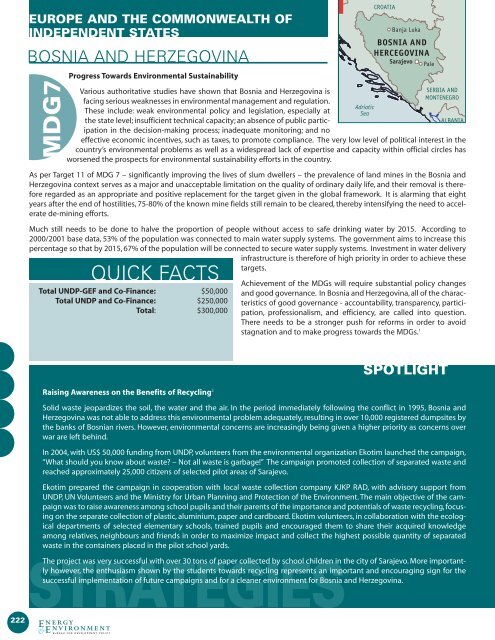ENG - UN CC:Learn
ENG - UN CC:Learn
ENG - UN CC:Learn
Create successful ePaper yourself
Turn your PDF publications into a flip-book with our unique Google optimized e-Paper software.
EUROPE AND THE COMMONWEALTH OF<br />
INDEPENDENT STATES<br />
BOSNIA AND HERZEGOVINA<br />
MDG7<br />
Progress Towards Environmental Sustainability<br />
Various authoritative studies have shown that Bosnia and Herzegovina is<br />
facing serious weaknesses in environmental management and regulation.<br />
These include: weak environmental policy and legislation, especially at<br />
the state level; insufficient technical capacity; an absence of public participation<br />
in the decision-making process; inadequate monitoring; and no<br />
effective economic incentives, such as taxes, to promote compliance. The very low level of political interest in the<br />
country’s environmental problems as well as a widespread lack of expertise and capacity within official circles has<br />
worsened the prospects for environmental sustainability efforts in the country.<br />
As per Target 11 of MDG 7 – significantly improving the lives of slum dwellers – the prevalence of land mines in the Bosnia and<br />
Herzegovina context serves as a major and unacceptable limitation on the quality of ordinary daily life, and their removal is therefore<br />
regarded as an appropriate and positive replacement for the target given in the global framework. It is alarming that eight<br />
years after the end of hostilities, 75-80% of the known mine fields still remain to be cleared, thereby intensifying the need to accelerate<br />
de-mining efforts.<br />
Much still needs to be done to halve the proportion of people without access to safe drinking water by 2015. According to<br />
2000/2001 base data, 53% of the population was connected to main water supply systems. The government aims to increase this<br />
percentage so that by 2015, 67% of the population will be connected to secure water supply systems. Investment in water delivery<br />
infrastructure is therefore of high priority in order to achieve these<br />
targets.<br />
QUICK FACTS<br />
Total <strong>UN</strong>DP-GEF and Co-Finance: $50,000<br />
Total <strong>UN</strong>DP and Co-Finance: $250,000<br />
Total: $300,000<br />
Adriatic<br />
Sea<br />
CROATIA<br />
Banja Luka<br />
BOSNIA AND<br />
HERCEGOVINA<br />
Sarajevo<br />
Achievement of the MDGs will require substantial policy changes<br />
and good governance. In Bosnia and Herzegovina, all of the characteristics<br />
of good governance - accountability, transparency, participation,<br />
professionalism, and efficiency, are called into question.<br />
There needs to be a stronger push for reforms in order to avoid<br />
stagnation and to make progress towards the MDGs. 1<br />
Pale<br />
SERBIA AND<br />
MONTENEGRO<br />
ALBANIA<br />
Raising Awareness on the Benefits of Recycling 2<br />
SPOTLIGHT<br />
Solid waste jeopardizes the soil, the water and the air. In the period immediately following the conflict in 1995, Bosnia and<br />
Herzegovina was not able to address this environmental problem adequately, resulting in over 10,000 registered dumpsites by<br />
the banks of Bosnian rivers. However, environmental concerns are increasingly being given a higher priority as concerns over<br />
war are left behind.<br />
In 2004, with US$ 50,000 funding from <strong>UN</strong>DP, volunteers from the environmental organization Ekotim launched the campaign,<br />
“What should you know about waste – Not all waste is garbage!” The campaign promoted collection of separated waste and<br />
reached approximately 25,000 citizens of selected pilot areas of Sarajevo.<br />
Ekotim prepared the campaign in cooperation with local waste collection company KJKP RAD, with advisory support from<br />
<strong>UN</strong>DP, <strong>UN</strong> Volunteers and the Ministry for Urban Planning and Protection of the Environment. The main objective of the campaign<br />
was to raise awareness among school pupils and their parents of the importance and potentials of waste recycling, focusing<br />
on the separate collection of plastic, aluminium, paper and cardboard. Ekotim volunteers, in collaboration with the ecological<br />
departments of selected elementary schools, trained pupils and encouraged them to share their acquired knowledge<br />
among relatives, neighbours and friends in order to maximize impact and collect the highest possible quantity of separated<br />
waste in the containers placed in the pilot school yards.<br />
STRATEGIES<br />
The project was very successful with over 30 tons of paper collected by school children in the city of Sarajevo. More importantly<br />
however, the enthusiasm shown by the students towards recycling represents an important and encouraging sign for the<br />
successful implementation of future campaigns and for a cleaner environment for Bosnia and Herzegovina.<br />
222

















